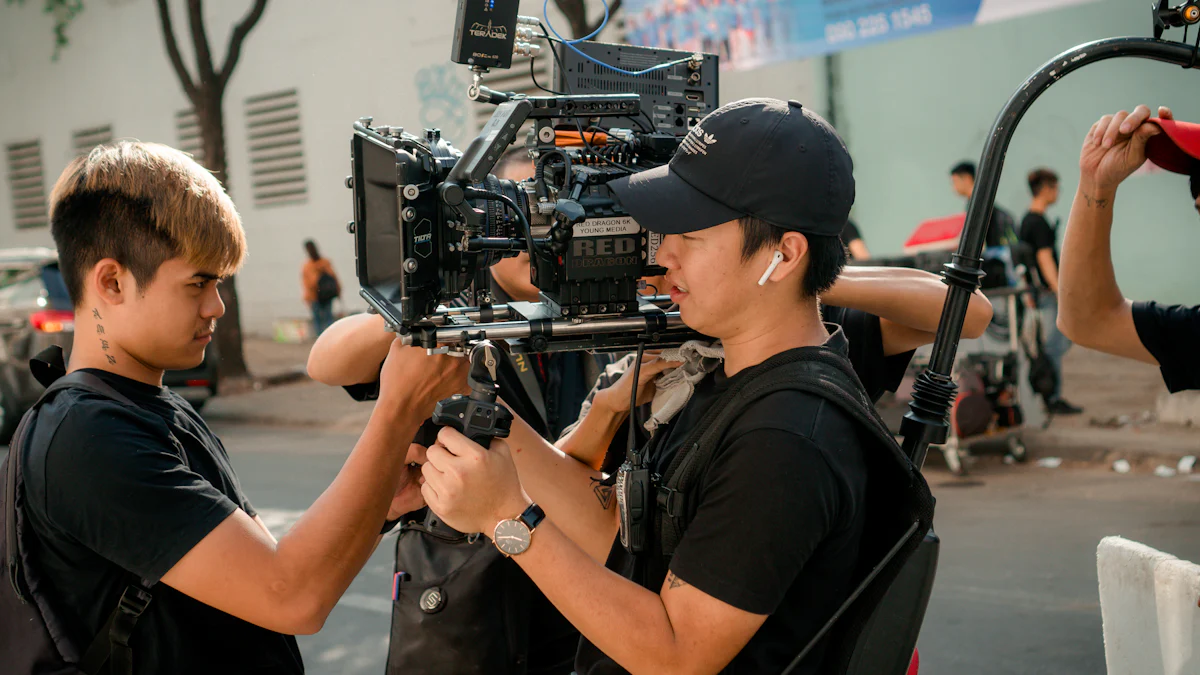Discovering Media and Entertainment Production Jobs

Welcome to the vibrant world of Media & Entertainment Production! This industry offers you a thrilling journey filled with creativity and innovation. Understanding production jobs is crucial as they form the backbone of every successful project. From directing to sound engineering, these roles account for the magic you see on screen. The opportunities are diverse, with job growth predictions showing a faster than average increase. Whether you're booking your first gig or climbing the career ladder, this field promises excitement and growth.
Overview of the Media and Entertainment Industry
The media and entertainment industry is booming, offering you a world of opportunities. Let's dive into what's driving this growth and explore the key sectors that make it all happen.
Industry Growth and Trends
Technological Advancements
Technology is reshaping the media landscape. You see it in the rise of virtual reality (VR) and augmented reality (AR), which create immersive experiences. These technologies are not just for gaming anymore; they're transforming how you consume content. Online streaming platforms are another game-changer. They offer original content that keeps you hooked. To thrive in this field, you need technical proficiency in video editing, sound engineering, and visual effects. These skills are essential as the industry embraces 4K and 8K technologies.
Market Demand
Market demand is skyrocketing. Consumers crave personalized content, and streaming services are consolidating to meet these needs. Influencer marketing and social media collaborations are on the rise, creating new avenues for engagement. As a result, the demand for skilled professionals is growing. The Bureau of Labor Statistics (BLS) predicts job growth in this sector will be faster than average. This means more opportunities for you to jump in and make your mark.
Key Sectors in the Industry
Film and Television
Film and television remain at the heart of the entertainment world. Directors, producers, and film crews work tirelessly to bring stories to life. With the advent of streaming platforms, there's a surge in demand for fresh content. This opens doors for you to explore various roles, from behind-the-scenes production to on-screen talent.
Music and Audio Production
Music and audio production offer exciting career paths. Sound engineers and music producers play crucial roles in creating the perfect soundscape. The industry is evolving with new technologies, allowing you to experiment with innovative techniques. Whether you're mixing tracks or producing beats, the possibilities are endless.
Exploring Production Job Roles

Film and Television Production
Director
As a director, you hold the creative vision for a film or TV show. You guide actors, oversee the set, and make crucial decisions about the visual storytelling. Your role is pivotal in bringing a script to life. Directors often start as assistant directors or in other crew roles, gradually building their experience and reputation.
Producer
Producers manage the business side of production. You handle budgets, schedules, and coordinate with various departments to ensure everything runs smoothly. Your organizational skills and ability to multitask are key. Networking with industry professionals can open doors to exciting projects and collaborations.
Film Crew Roles
Film crews consist of diverse roles like camera operators, lighting technicians, and editors. Each position plays a vital part in the production process. You might start as a runner or assistant, learning the ropes and gaining hands-on experience. This path offers a chance to specialize and grow within the industry.
Music Production
Sound Engineer
Sound engineers focus on the technical aspects of music production. You work with audio equipment to record, mix, and produce soundtracks. Mastering software proficiency and equipment handling is essential. Many sound engineers begin by assisting in studios, gradually honing their craft.
Music Producer
As a music producer, you shape the sound and direction of a music project. You collaborate with artists, arrange compositions, and oversee recording sessions. Creativity and a keen ear for music are your tools. Engaging with industry workshops and online courses can enhance your skills and open up new opportunities.
"Networking and gaining experience through internships or job fairs can significantly enhance job prospects in the media and entertainment field."
Exploring these roles offers a glimpse into the dynamic world of media production. Whether you're drawn to the visual storytelling of film or the auditory artistry of music, each path provides unique challenges and rewards.
Essential Skills for Production Jobs
To thrive in media and entertainment production, you need a blend of technical and soft skills. These skills not only help you excel in your role but also make you a valuable team member. Let's dive into what you need to succeed.
Technical Skills
Software Proficiency
In today's digital age, mastering software tools is crucial. You need to be comfortable with editing software like Adobe Premiere Pro or Final Cut Pro for video production. For audio work, tools like Pro Tools or Logic Pro are essential. These programs help you create polished, professional content. As you become proficient, you'll find that your ability to produce high-quality work improves significantly.
Equipment Handling
Handling equipment efficiently is another vital skill. Whether you're working with cameras, microphones, or lighting gear, understanding how to operate them is key. You should know how to set up and troubleshoot equipment quickly. This skill ensures that you can adapt to different production environments and maintain the quality of your work.
Soft Skills
Communication
Communication is the backbone of any successful production. You need to convey ideas clearly and collaborate effectively with your team. Whether you're discussing a scene with a director or coordinating with a sound engineer, clear communication ensures everyone is on the same page. This skill helps prevent misunderstandings and keeps the production process smooth.
Teamwork
Teamwork is essential in media production. You often work with diverse teams, each member bringing unique skills to the table. Your ability to collaborate and support your colleagues can make or break a project. Embracing teamwork means being open to feedback and willing to assist others when needed. This approach fosters a positive work environment and leads to successful productions.
"Harnessing creativity, communication, and leadership to craft compelling stories while expertly managing teams and production challenges."
Incorporating these skills into your daily routine will set you apart in the media and entertainment industry. As you develop both technical and soft skills, you'll find yourself better equipped to handle the demands of production jobs. Remember, the key to success lies in continuous learning and adapting to new challenges.
Educational Pathways and Training

Embarking on a career in media and entertainment production requires the right educational foundation. You have several pathways to choose from, each offering unique insights and skills. Let's explore these options to help you find the best fit for your aspirations.
Degree Programs
Film Studies
Pursuing a degree in film studies opens doors to various careers in media. You dive deep into the history, theory, and criticism of film. This program enhances your understanding of cinematic storytelling and visual aesthetics. You'll learn about different genres, directors, and film movements. Many universities offer hands-on experiences, allowing you to work on student films and projects. This practical exposure is invaluable as you prepare for roles in directing, screenwriting, or film criticism.
Audio Engineering
If sound is your passion, consider a degree in audio engineering. This program equips you with the technical skills needed for careers in media, particularly in music and audio production. You study sound design, mixing, and recording techniques. Courses often include studio work, giving you real-world experience with industry-standard equipment. As you progress, you'll develop a keen ear for detail and a strong understanding of acoustics. These skills are crucial for roles like sound engineer or music producer.
Certification and Workshops
Online Courses
Online courses offer flexibility and convenience, making them an excellent choice for those balancing other commitments. Platforms like Coursera and Udemy provide courses in film production, editing, and sound design. These courses allow you to learn at your own pace, covering topics from basic techniques to advanced concepts. Completing online courses can enhance your resume and demonstrate your commitment to continuous learning in the entertainment business.
Industry Workshops
Industry workshops provide hands-on training and networking opportunities. These events often feature experts from the entertainment business, offering insights into current trends and technologies. Workshops cover various topics, from cinematography to digital marketing. Attending these sessions helps you stay updated with industry advancements and connect with professionals. Networking at workshops can lead to internships or job offers, giving you a head start in your career.
"68% of educators desire a blend of traditional classroom and virtual tools, highlighting the evolving nature of education in media and entertainment."
Choosing the right educational pathway sets the stage for a successful career in media. Whether you opt for a degree program or seek additional training through certifications and workshops, each step brings you closer to your dream role in the entertainment business. Remember, the key is to stay curious and open to learning new skills.
Career Advancement and Opportunities
In the media and entertainment industry, advancing your career involves more than just honing your skills. You need to actively engage with the community and seize opportunities that come your way. Let's explore how you can elevate your career through networking and understanding the job market.
Networking in the Industry
Networking plays a crucial role in your career growth. Building connections can open doors to new opportunities and collaborations. Here's how you can make the most of networking in the media and entertainment field.
Industry Events
Attending industry events is a fantastic way to meet professionals and learn about the latest trends. These gatherings offer you a chance to engage with peers, share ideas, and gain insights from experts. Whether it's a film festival, music conference, or media expo, these events provide a platform for you to showcase your talents and connect with potential collaborators. Remember, every conversation is an opportunity to expand your network and discover new paths in your career.
Professional Associations
Joining professional associations can significantly boost your career prospects. These organizations offer resources, training, and networking opportunities tailored to your field. As a member, you gain access to exclusive events, workshops, and job boards. Associations often host seminars and webinars where you can learn from industry leaders. By actively participating, you not only enhance your skills but also increase your visibility in the industry. This involvement can lead to valuable connections and potential job offers.
"What differentiates MRG is their diligence in going beyond the basics by developing a full understanding of our company culture in pursuit of candidates who will work both on paper and in practice."
Job Market and Salary Expectations
Understanding the job market and salary expectations is essential for planning your career path. Let's break down what you can expect at different stages of your career.
Entry-Level Positions
Starting your career in media and entertainment often involves entry-level roles. Positions like account executives or artist managers serve as stepping stones. As an account executive, you manage client relationships and coordinate projects. This role requires strong communication skills and a knack for organization. On the other hand, an artist manager focuses on guiding artists' careers, handling everything from bookings to promotions. Both roles offer valuable experience and a chance to learn the ropes of the industry.
Experienced Roles
As you gain experience, you can move into more advanced positions. Experienced roles often come with increased responsibilities and higher salaries. For instance, seasoned account executives may oversee larger accounts or lead teams. Similarly, an experienced artist manager might work with high-profile clients, negotiating contracts and strategizing career moves. These roles demand a deep understanding of the industry and strong leadership skills. With dedication and perseverance, you can climb the ladder and achieve your career goals.
"Furthermore, in a time where the industry needs it, they go above and beyond for his clients and his business to offer incredibly practical and valuable career training opportunities."
By focusing on networking and understanding the job market, you can navigate your career path with confidence. Whether you're just starting or looking to advance, these strategies will help you make informed decisions and seize opportunities in the dynamic world of media and entertainment.
Exploring media and entertainment production jobs opens a world of exciting career opportunities. From directing films to engineering sound, each role offers unique challenges and rewards. You have the chance to shape stories and create captivating experiences. *Internships and apprenticeships provide invaluable hands-on experience*, helping you build connections and enhance your skills. The industry is ever-evolving, driven by technological advancements and creative innovation. Embrace this dynamic field with enthusiasm and curiosity. Your journey in media and entertainment promises growth, creativity, and the fulfillment of sharing stories that resonate with audiences worldwide.
See Also
Key EdTech Careers You Need to Be Aware Of
Copywriter Pay Analysis: Beginners to Experienced Writers
Vital Advice for Podcast Video Creators
